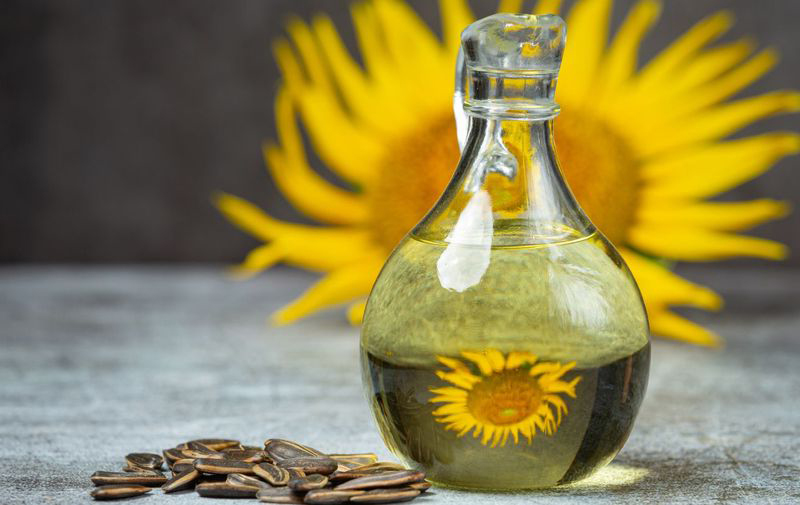Sunflower oil crisis in Ukraine hits food from chips to biscuits

Russia’s invasion of Ukraine has disrupted supplies to almost half the world’s population sunflower oil exports, forcing companies to turn to less desirable alternatives like palm oil in products ranging from potato chips to biscuits.
Thousands of items, including ready meals and even wrapping paper, use sunflower oil. Prices are rising and the ingredient will only become scarcer from the summer as Ukrainian farmers may struggle to grow and export the crop.
“Sunflower oil prices are up 1,000%, but it’s less about price as the oils are often just a small part of the products,” he said Richard Walker, the managing director of grocery chain Iceland Foods. “The real challenge is getting your hands on it.”
Just as the food industry was getting a grip on dealing with Covid-related shortages, Russia’s invasion of Ukraine has exacerbated the situation as the war has pushed up the prices of basic ingredients like wheat. US President Joe Biden has warned that the world will experience food shortages and countries should prepare for alternative sources.
Walker said 450 products Iceland Foods sells are affected, and while many may use alternatives such as canola oil, the grocer will have no choice but to “regrettably” use palm oil in about 30 to 40 products. This is a reversal of a high-profile 2018 pledge by the grocer to remove all palm oil from its own-brand lines amid concerns about its link to forest destruction.
“I just don’t know how much longer this is going to go on,” said Walker from Iceland, adding that only sustainably grown palm oil is used. “The only alternative to using palm oil in the current circumstances would be to simply clear our freezers and shelves of a variety of staples.”
Wm Morrison Supermarkets said she too must use sustainable palm oil in some products if she can’t switch to alternatives like canola oil.
Russia’s invasion has caused a humanitarian catastrophe in Ukraine and disrupted food trade around the world, sending wheat and corn prices up to their highest levels in a decade. Ukraine is a major grain supplier for countries in the Middle East. Meat prices are also under pressure as feed costs for cattle and pigs increase.
Ukrainian farmers are pushing ahead with spring sowing but will face challenges as they struggle with shortages of labour, fuel and fertilizers. Russia has blocked Ukrainian ports, cutting off the traditional export route. Ukrainian President Volodymyr Zelenskyy said Thursday that Russian troops are targeting agriculture, planting landmines in farms and destroying machinery.
“Where sunflower oil is present as an ingredient in products, retailers will replace it with other safer oils like canola oil,” he said Andrea Martinez-Inchausti, Deputy Food Director of the British Retail Consortium. For foods like potato chips that use sunflower oil as a key ingredient, retailers will put information about substitute oil on existing labels, she said.
The British Sandwich & Food to Go Association requires sellers to put up signs with pre-packaged sandwiches explaining that some ingredients may have changed because the packs were pre-printed. Philippines-based company Monde Nissin said it was replacing UK rapeseed oil with sunflower oil in its meat alternatives.
Companies that use sunflower oil for frying have replaced it with palm oil, soybean oil and canola oil, industry group Fediol said. Andrew Crook, president of Britain’s National Federation of Fish Friers, said prices for 20-litre drums of sunflower oil have risen from £30 to £40 ($52) in the past two weeks at his own shop in Euxton, north-west England . They typically have eight or nine a week and may need to switch to palm oil at some point, though he values sunflowers for their “nice, clean taste.”
The concerns are all the greater food prices and the need to look further afield for supplies will dilute food standards in Europe and force companies to choose ingredients that may be more harmful to the environment. Palm oil and soy have come under increasing scrutiny in recent years for their role in deforestation, prompting plans for EU import restrictions.
According to Hemeline Macret, head of oilseeds market analysis at Strategie Grains, canola oil is seeing the strongest increase in demand. “It’s already used in food and palm oil isn’t very popular because of its bad image.” Soybean oil isn’t used in many recipes because it’s often made from genetically modified soy, she said.
The war is exacerbating an already strained supply chain as transportation problems and crop failures drive food prices to record highs. Rising costs of staple foods in import-dependent countries in the Middle East and North Africa are bringing people’s resilience to a “strain point,” according to the United Nations World Food Program.
“If this war doesn’t stop soon, supply disruptions could continue from now until 2023,” said Hemeline Macret.
Read also
Trump announces new tariff ultimatums for Mexico and the EU
Oilseed Season 2025/26: Déjà Vu or New Chapter?
Nigeria, Brazil sign $1 billion deal to boost agriculture, energy
Corn exports from Ukraine in MY 2025/26 will increase by 3 mln tons
Feed wheat supplies are disappearing from the Black Sea markets, demand prices hav...
Write to us
Our manager will contact you soon



